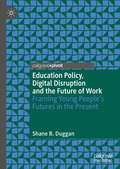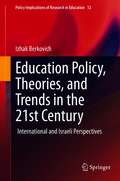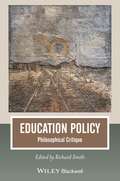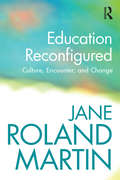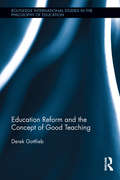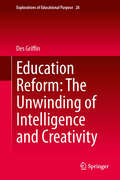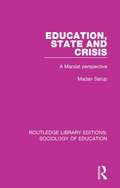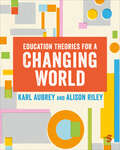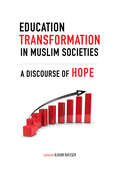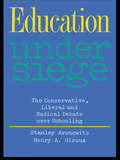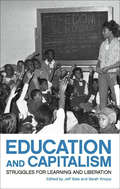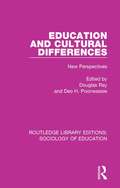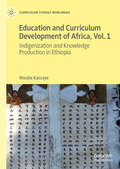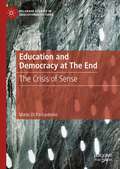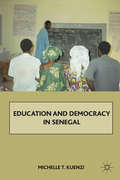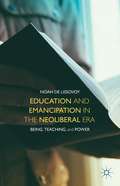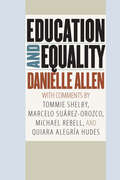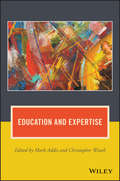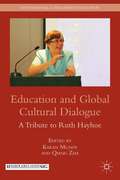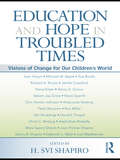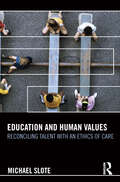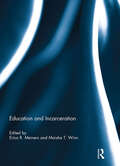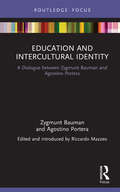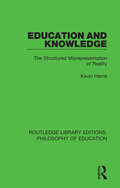- Table View
- List View
Education Policy, Digital Disruption and the Future of Work: Framing Young People’s Futures in the Present
by Shane B. DugganThis book examines the possibilities, practices and consequences of digital disruption and networked economies in education policy. As traditional notions of learning and labour are abstracted by networked technologies, young people are exposed to new forms of governance and intervention. Tracing key education policy shifts from the turn of the millennium to the present day, this book explores notions of value, aspiration, and equity in the context of the rise of the networked economies and the ‘end of work’. It argues that a policy focus on preparing young people for the future – a future that will be dominated by networked technologies – informs both what counts as ‘success', and reorganises young people’s orientation in the present in new commodified forms. In an era where the costs of higher education are rapidly increasing despite their relative decline in value, this book will resonate with scholars in youth and educational studies, as well as those with an interest in emerging forms of labour and work.
Education Policy, Theories, and Trends in the 21st Century: International and Israeli Perspectives (Policy Implications of Research in Education #12)
by Izhak BerkovichThis book provides a highly accessible overview of public education policy. It organizes knowledge about 21st century education policy around two main topics: the policy process, and the discourse on public education policy. This unique organization provides a novel lens for better understanding the dynamics and contents of current education policy making. The work also offers a broad overview of theories of public policy, economics, demography, sociology, history, and psychology. Each chapter includes a discussion of data derived from the international and Israeli contexts. The book provides a series of valuable insights relevant to researchers, practitioners, and policymakers interested in understanding the multifaceted aspects that shape contemporary education policy.
Education Policy: Philosophical Critique (Journal of Philosophy of Education #7)
by Richard SmithEducation Policy sees 12 philosophers of education critique current and recent UK educational policies relating to higher education and faith-based education, assessment, the teaching of reading, vocational and civic education, teacher education, the influence of Europe and the idea of the ‘Big Society’. Twelve philosophers of education subject elements of current and recent UK educational policy to critique Forthright and critical, the contributors are unafraid to challenge current orthodoxies Offers thought-provoking insights into modern education policy Wide-ranging topics cover higher education and faith-based education, assessment, the teaching of reading, vocational and civic education, teacher education, the influence of Europe and the idea of the ‘Big Society’
Education Reconfigured: Culture, Encounter, and Change
by Jane Roland MartinAs philosophers throughout the ages have asked: What is justice? What is truth? What is art? What is law? In Education Reconfigured, the internationally acclaimed philosopher of education, Jane Roland Martin, now asks: What is education? In answer, she puts forward a unified theory that casts education in a brand new light. Martin’s "theory of education as encounter" places culture alongside the individual at the heart of the educational process, thus responding to the call John Dewey made over a century ago for an enlarged outlook on education. Look through her theory’s lens and you can see that education takes place not only in school but at home, on the street, in the mall—everywhere and all the time. Look through that lens and you can see that education does not always spell improvement; rather, it can be for the better or the worse. Indeed, you can see that education is inevitably a maker and shaper of both individuals and cultures. Above all, Martin’s new educational paradigm reveals that education is too important to be left solely to the professionals; that it is one of the great forces in human society and, as such, deserves the attention and demands the vigilance of every thoughtful person.
Education Reform and the Concept of Good Teaching (Routledge International Studies in the Philosophy of Education #34)
by Derek GottliebIn an effort to address the problems confronting the American education system, the Obama administration has issued structural and systematic reforms such as Race to the Top. These initiatives introduce new statistics and accountability systems to gauge what constitutes "good" teaching, both from an administrative standpoint and the perspective of teacher training programs. This volume offers a direct critique of this approach, concluding that it does not respond adequately to the issues of education reform but rather raises new problems and actively stymies progress. The author argues that at the heart of the confusion lies a misguided and rationalistic view of teaching and learning. He draws on the philosophical strategies of Ludwig Wittgenstein to break down the guiding assumptions of Race to the Top, allowing both the positive and the negative aspects of the policies to be heard. The author then proposes a different view of teaching and learning which considers how to effectively address the problems Race to the Top seeks to confront.
Education Reform: The Unwinding of Intelligence and Creativity
by Des GriffinThis book pays special attention to the impact that a student's early childhood and socioeconomic status has on his or her educational achievement. It argues that discussions of education reform need a broader scope, one that encompasses a student's background as well as standardized testing, merit pay for teachers, and other issues regarding the quality of the teaching and learning. Education Reform: the Unwinding of Intelligence and Creativity features cases and examples from schools in Australia, the USA, and Britain. It offers a breadth of coverage, from early childhood to effective teaching and learning to teacher pay and conditions, standardized testing and public and private (independent) schooling and universities as well as creativity. It also includes summaries of educational policies in many developed countries. Reforms which emphasize concern for early childhood, school leadership and respect for teachers are contrasted with ones based on standardized tests, private schools and sacking bad teachers.
Education State and Crisis: A Marxist Perspective (Routledge Library Editions: Sociology of Education #47)
by Madan SarupFirst published in 1982, this work is a critical survey of contemporary educational debates and themes which took on new urgency and importance at the time. In particular, it explores the problematic nature of ‘progressive education’ and ‘discipline’; the changes in the labour process and youth unemployment; the nature of the state and its relationship with schooling; the growth of state intervention and the specific forms of discrimination suffered by women and black people. It argues that trends in education at the time can be explained by a Marxist analysis. It suggests that the changes taking place in schools and colleges were expressions of the contradictions of capitalism and of the state’s attempt to restructure education.
Education Theories for a Changing World
by Karl Aubrey Alison RileyHow can education be a vehicle for social change? This book looks at how different educational theories can be used to address complex and vital issues in society by exploring key concepts and challenging traditional thought through an educational lens. Each topic area is explored in both theoretical and practical terms with direct application to the classroom throughout. Key topics include: The climate crisis The Black Lives Matter movement The rise of right-wing populism The experience of LGBTQ+ students in school The impact of COVID-19 This is essential reading for anyone training to teach at any age phase and students undertaking the academic study of education.
Education Theories for a Changing World
by Karl Aubrey Alison RileyHow can education be a vehicle for social change? This book looks at how different educational theories can be used to address complex and vital issues in society by exploring key concepts and challenging traditional thought through an educational lens. Each topic area is explored in both theoretical and practical terms with direct application to the classroom throughout. Key topics include: The climate crisis The Black Lives Matter movement The rise of right-wing populism The experience of LGBTQ+ students in school The impact of COVID-19 This is essential reading for anyone training to teach at any age phase and students undertaking the academic study of education.
Education Transformation in Muslim Societies: A Discourse of Hope (Advancing Education in Muslim Societies)
by Shelley Wong Nuraan Davids Andreas M. Krafft Bassam Abu Hamad Mualla Selcuk Suhailah Hossien Sulieman Mleahat Nora El-Bilawi Sher Afgan Tareen Afeefa Syeed Tyron PittsHope is a complex concept—one academics use to accept the unknown while also expressing optimism. However, it can also be an action-oriented framework with measurable outcomes.In Education Transformation in Muslim Societies, scholars from around the world offer a wealth of perspectives for incorporating hope in the education of students from kindergarten through university to stimulate change, dialogue, and transformation in their communities. For instance, though progress has been made in Muslim societies on early education and girls' enrollment, it is not well documented. By examining effective educational initiatives and analyzing how they work, educators, policymakers, and government officials can create a catalyst for positive educational reform and transformation. Adopting strength-based educational discourse, contributors to Education Transformation in Muslim Societies reveal how critical the whole-person approach is for enriching the brain and the spirit and instilling hope back into the teaching and learning spaces of many Muslim societies and communities.Education Transformation in Muslim Societies is a copub with the International Institute of Islamic Thought.
Education Under Siege: The Conservative, Liberal and Radical Debate over Schooling (Critical Studies In Education)
by Henry A. Giroux Stanley AronowitzFirst published in 1987. Routledge is an imprint of Taylor & Francis, an informa company.
Education and Capitalism: Struggles for Learning and Liberation
by Jeff Bale Sarah KnoppEducators examine the state of public schooling, confront the anti-union stance of policymakers, and offer a bold new direction in this essay anthology.A conservative, bipartisan consensus dominates the discussion about what’s wrong with our schools and how to fix them. It offers “solutions” that scapegoat teachers, vilify unions, and impose a market mentality on education. In Education and Capitalism, teacher-activists expose the damaging limitations of this elite consensus and offer an alternative vision of learning for liberation.Co-editors Sarah Knopp and Jeff Bale presents a powerful defense of public education. Other contributors offer historical analysis of school reform with a focus on civil rights and union-led movements. Arguing that today’s schools are designed to serve the needs of capitalism rather than students, this volume offers an action plan for positive change.
Education and Cultural Differences: New Perspectives (Routledge Library Editions: Sociology of Education #44)
by Douglas Ray Deo H. PoonwassieFirst published in 1992, this book looks at the interaction between ideals and reality, with the focus upon social inequality and education in modern society, as well as the possibilities for education to lessen the related problems. The essays in this volume examine three forms of inequality in global society: aboriginal societies in modern industrial states; long-established communities that have been denied full status; and differences arising from recent population migrations. In doing so, it considers how education might support the efforts of all members of society to pursue the goal of equal status for all.
Education and Curriculum Development of Africa Vol. 1: Indigenization and Knowledge Production in Ethiopia (Curriculum Studies Worldwide)
by Woube KassayeThis book, the first of two volumes, focuses on the conceptualization of Indigenous Knowledge and Curriculum, Ethiopian/African Philosophy and the possibilities of Indigenization/Africanization of African Education. Its main purpose is to overview the practices of traditional/indigenous education of Africa with emphasis on Ethiopia’s experience connected with curriculum development, and make possible suggestions that could contribute to curriculum development endeavors of Africa. The cultural heritage of the majority African countries is either ignored or not adequately considered in the formulation of educational policies and curricula in their modern African educational systems. Hence, a new path and paradigm shift are needed. To this end, considering Africa's outstanding IK with useful experiences of other countries in education particularly in the curriculum is critical to bring the required change.
Education and Democracy at The End: The Crisis of Sense (Palgrave Studies in Educational Futures)
by Mario Di PaolantonioThis book grapples with what it means when education and democracy are at an end: when these two foundational aspects of our society seem to have reached a culminating point, no longer appearing to produce and make sense amid the crises of our time. Engaging topical political events and mobilizing a variety of cultural resources, Di Paolantonio shows that today the possibility of the future and the significance of an expansive transgenerational sensibility are radically in question as trends toward destruction, cruelty, and banality are steering world-defying calamities, and sparking “chronopathologies” of doom and despair among the planet’s occupants. Unfolding his argument through a series of accessible chapters that draw on contemporary philosophy, educational thinking, and cultural-artistic works, Di Paolantonio explores how the transgenerational sensibility retains a possibility we might tap for overcoming the impasses of our time.
Education and Democracy in Senegal
by Michelle T. KuenziThis book examines the role of non-formal education (NFE) in promoting democracy in Senegal.
Education and Emancipation in the Neoliberal Era
by Noah De LissovoyThis book describes how neoliberalism as societal philosophy works to limit human potential in our school systems. Analyzing contemporary school reform and control, punishment, and pathologization in schools, this book outlines a theory of emancipation and a process by which pedagogy can build solidarity in classrooms and society more broadly.
Education and Equality
by Danielle AllenAmerican education as we know it today--guaranteed by the state to serve every child in the country--is still less than a hundred years old. It's no wonder we haven't agreed yet as to exactly what role education should play in our society. In these Tanner Lectures, Danielle Allen brings us much closer, examining the ideological impasse between vocational and humanistic approaches that has plagued educational discourse, offering a compelling proposal to finally resolve the dispute. Allen argues that education plays a crucial role in the cultivation of political and social equality and economic fairness, but that we have lost sight of exactly what that role is and should be. Drawing on thinkers such as John Rawls and Hannah Arendt, she sketches out a humanistic baseline that re-links education to equality, showing how doing so can help us reframe policy questions. From there, she turns to civic education, showing that we must reorient education's trajectory toward readying students for lives as democratic citizens. Deepened by commentaries from leading thinkers Tommie Shelby, Marcelo Suárez-Orozco, Michael Rebell, and Quiara Alegría Hudes that touch on issues ranging from globalization to law to linguistic empowerment, this book offers a critical clarification of just how important education is to democratic life, as well as a stirring defense of the humanities.
Education and Expertise (Journal of Philosophy of Education)
by Christopher Winch Mark AddisThe relevance of expertise to professional education and practice is explored in this collection of original contributions from educationalists, philosophers and psychologists. <p><p> Discusses the increasingly prominent debates about the nature of know-how in mainstream analytical epistemology <p> Illuminates what is involved in professional expertise and the implications of a sound understanding of professional expertise for professional education practice, curriculum design and assessment <p> All contributions are philosophically grounded and reflect interdisciplinary advances in understanding expertise
Education and Global Cultural Dialogue
by Qiang Zha Karen MundyCultural and spiritual resources are arguably essential to achievement of educational goals, both as economic and political initiatives and as human rights. This book addresses questions surrounding education and inter-cultural understanding in a broad global framework.
Education and Hope in Troubled Times: Visions of Change for Our Children's World (Sociocultural, Political, and Historical Studies in Education)
by H. Svi Shapiro"Progressive educators have always been better at critique than at possibility. This book promises not to ignore critique, but to favor possibility. It is most rare and greatly welcomed." Richard Quantz, Miami University "The editor argues that in a material world, depicted by consumerism, spiritual nihilism and conspicuous consumption, there is need to offer a new vision and direction in education that would promote a more harmonious, holistic values-oriented schooling that transforms persons into moral beings, who care for others…. In terms of innovative ideas and approaches to pedagogy and theorizing about schooling, this volume is at the top of pedagogical discourses and thinking." Joseph Zajda, Australian Catholic University (Melbourne Campus) Education and Hope in Troubled Times brings together a group of the best and most creative educational thinkers to reflect on the purpose and future of public education. These original essays by leading social and educational commentators in North America attempt to articulate a new vision for education, especially public education, and begin to set an alternative direction. This is a time of crisis, but also of renewed possibility—one that offers the opportunity to radically reconsider what is the meaning of education for a generation that will bear the brunt of grappling with the extraordinary dangers and challenges we confront today. At its core this volume questions what will it mean to be an educated human being in the 21st century compelled to confront and address so much that threatens the very basis of a decent and hopeful human existence. Carrying forward a project of redefining and reshaping public discourse on education in the U.S., it is a critical catalyst and focus for re-thinking public policy on education.
Education and Human Values: Reconciling Talent with an Ethics of Care
by Michael SloteTwo of our greatest educational theorists, John Dewey and Nel Noddings, have been reluctant to admit that some students are simply more talented than others. This was no doubt due to their feeling that such an admission was inconsistent with democratic concern for everyone. But there really is such a thing as superior talent; and the present book explains how that admission is compatible with our ideals of caring (and democracy). Traditionalists confident that some disciplines are more important than others haven’t worried that that way of putting things threatens to make those who are excluded feel quite bad about themselves. But an ethics of care can show us how to make these differences much less hurtful and more morally acceptable than anything that has been proposed by traditionalists. So the present book offers a middle way between the denial of the reality of superior talents and an insensitive insistence on that reality. It argues that care ethics gives us a way to do this, and it bases that claim largely on the promise of such an ethics for moral education in schools and in homes. It is argued on psychological grounds that caring can only take place on the basis of empathy for others, and the book shows in great detail how empathy can be encouraged or develop in school and home contexts. Other approaches to moral education—like Kantian cognitive-developmentalism and Aristotelian character education—can’t account for (increasing) moral motivation in the way that an emphasis on the development of empathy allows. And in the end, it is only students educated via care ethics who will be sensitive to one another in a way that largely undercuts the negative psychological impact of educational institutions and practices that acknowledge the greater talents or creativity that some students have.
Education and Incarceration
by Erica R. Meiners Maisha T. WinnThe United States of America is in possession of the largest prison population in the world, with 2.3 million people currently behind bars. This number is predominantly and disproportionately made up of communities of colour and poverty. Between 1987 and 2007, the U.S. prison population tripled; the direct result of various ‘tough on crime’ public policies. Organizers and scholars use the term prison industrial complex (PIC) to name the structure that encompasses the expanding economic and political contexts of the detention and corrections industry in the USA. The PIC is a network that sutures capital, communities and the State to a permanent punishment economy. The term ‘the PIC’ aims to capture the range of material and ideological forces that shape the growth of detention: the political and lobbying power of the corrections officers unions, the framing of prisons and jails as a growth industry in the context of deindustrialization, the production and sales of technology and security required to maintain and expand the state of incarceration, and the naturalization of isolation as a logical response to harm.Education and Incarceration highlights the significance of centering agency and autonomy, and documents scholars who work to be accountable to justice movements and communities, not simply to academic disciplines or to research. Additionally, as emerging scholars committed to challenging the PIC, these authors struggle to build multi-layered analytic and material tools for resistance within and beyond the walls of schools, jails and prisons. This book provides snapshots of practices in motion: activist scholars working to engage, to be accountable to families, communities and larger justice movements, and to build abolition democracies.This book was originally published as a special issue of Race Ethnicity and Education.
Education and Intercultural Identity: A Dialogue between Zygmunt Bauman and Agostino Portera
by Zygmunt Bauman Agostino PorteraEducation and Intercultural Identity offers a dialogue between influential authors Zygmunt Bauman and Agostino Portera that reflects on and discusses contemporary events and issues relating to the crisis of global normativity, education and intercultural identity. Centered around a previously unpublished dialogue between Bauman and Portera, the book contains an extended introduction by Riccardo Mazzeo that traces key themes in the dialogue and highlights the importance of education in our globalized world. The book highlights that intercultural and multicultural education is the best developed model to meet modern day challenges that include religious pluralism, pollution, and conflict. It also contains timely material relating to significant issues affecting society today; including the refugee crisis, rising authoritarian nationalism, and the risks and challenges of globalisation and sustainability. This book will be of great interest for academics, scholars and students in the fields of intercultural education, sociology and the sociology of education.
Education and Knowledge: The Structured Misrepresentation of Reality (Routledge Library Editions: Philosophy of Education #9)
by Kevin HarrisIn this book, first published in 1979, Kevin Harris explores the idea that in capitalist liberal democracies formal education functions essentially not to reveal reality, but rather to transmit to each new generation a structured misrepresentation of reality. In defence of this controversial and thought-provoking view, the author argues that all knowledge of the world is theory-laden and that a neutral, detached, objective description of the world is impossible. This title will be of interest to students of the philosophy of education.
